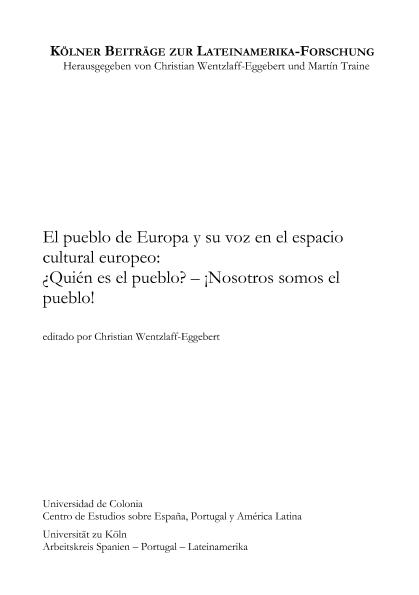Artículo
Historia en voz baja: la oralidad y el rumor para la narración de la Guerra Civil española en la "Primera derrota" de Alberto Méndez
Fecha de publicación:
12/2015
Editorial:
Universität zu Köln. Arbeitskreis Spanien, Portugal, Lateinamerika
Revista:
Kölner Beiträge zur Lateinamerika-Forschung
ISSN:
1438-6887
Idioma:
Español
Tipo de recurso:
Artículo publicado
Clasificación temática:
Resumen
The first of the four paths that structure the book Los girasoles ciegos, by Alberto Méndez, with its theory about the delayed end of the Spanish Civil War as a longing for destruction outside of any kind of strategy based on military logic, presents the construction of a memory based on a certain oral marks, facts provided quetly by apparently non-central characters, the distrust of written documents, and the use of speech patterns mostly associated with spontaneity in order to set up a level of verisimilitude which makes the memory emerge in parallel pathways considered relatively reliable (fort example, the case of a report), forged speech on the basis of indirect references, testimonials and letters. <br />The aim of the paper is to consider an example of contemporary Spanish narrative in which a journey, perhaps weak in terms of the material, support to the channels through which the narrator comes in the story through the voice of the people, but functional as an approach to a search of the recent past, contributes to a certain conception of memory.
Palabras clave:
Los Girasoles Ciegos
,
Memoria
,
Pasado Traumático
,
Testimonios
Archivos asociados
Licencia
Identificadores
Colecciones
Articulos(IDIHCS)
Articulos de INST.DE INVEST.EN HUMANIDADES Y CS SOCIALES
Articulos de INST.DE INVEST.EN HUMANIDADES Y CS SOCIALES
Citación
Sánchez, Mariela Paula; Historia en voz baja: la oralidad y el rumor para la narración de la Guerra Civil española en la "Primera derrota" de Alberto Méndez; Universität zu Köln. Arbeitskreis Spanien, Portugal, Lateinamerika; Kölner Beiträge zur Lateinamerika-Forschung; 13; 12-2015; 178-186
Compartir




